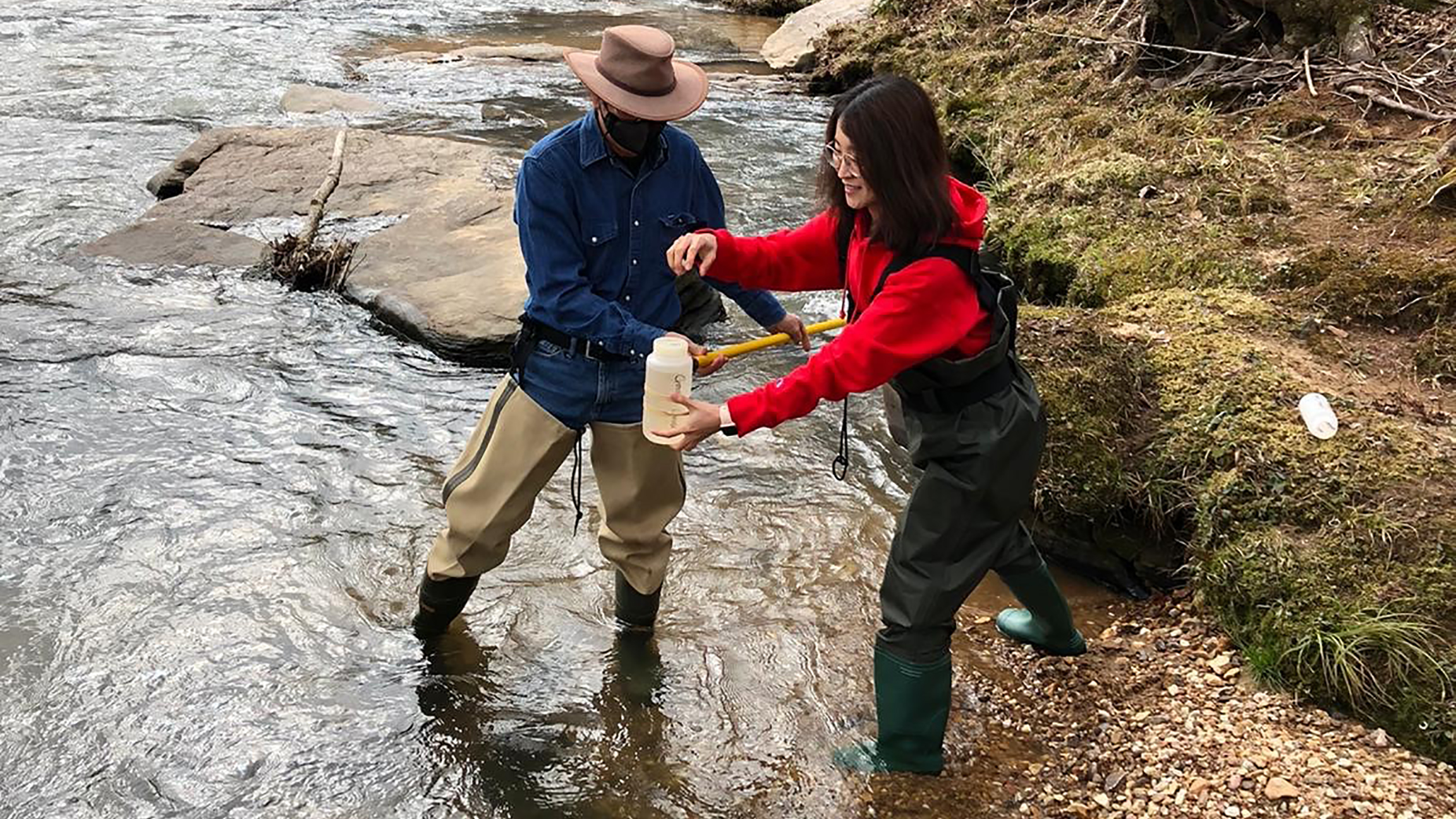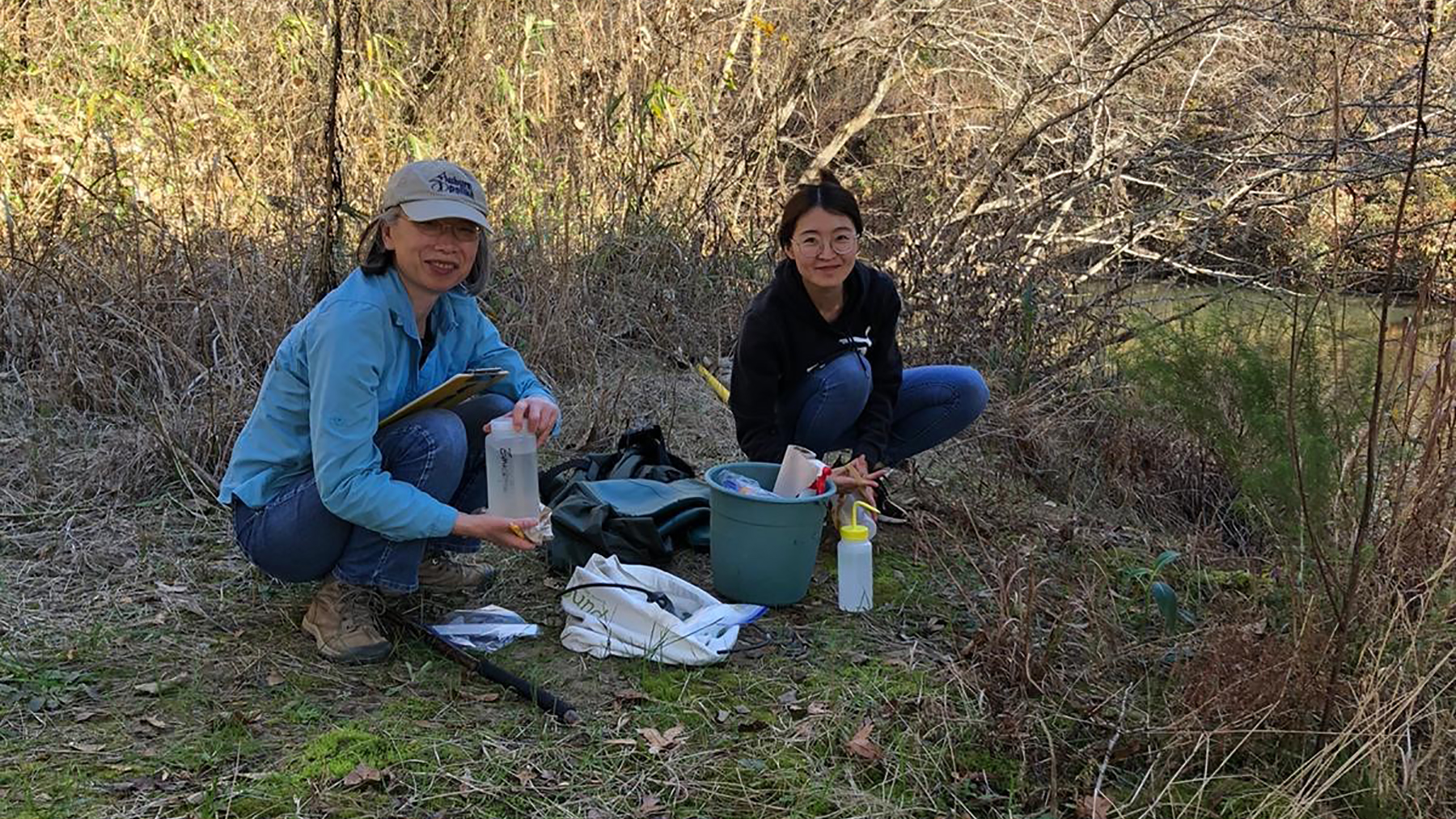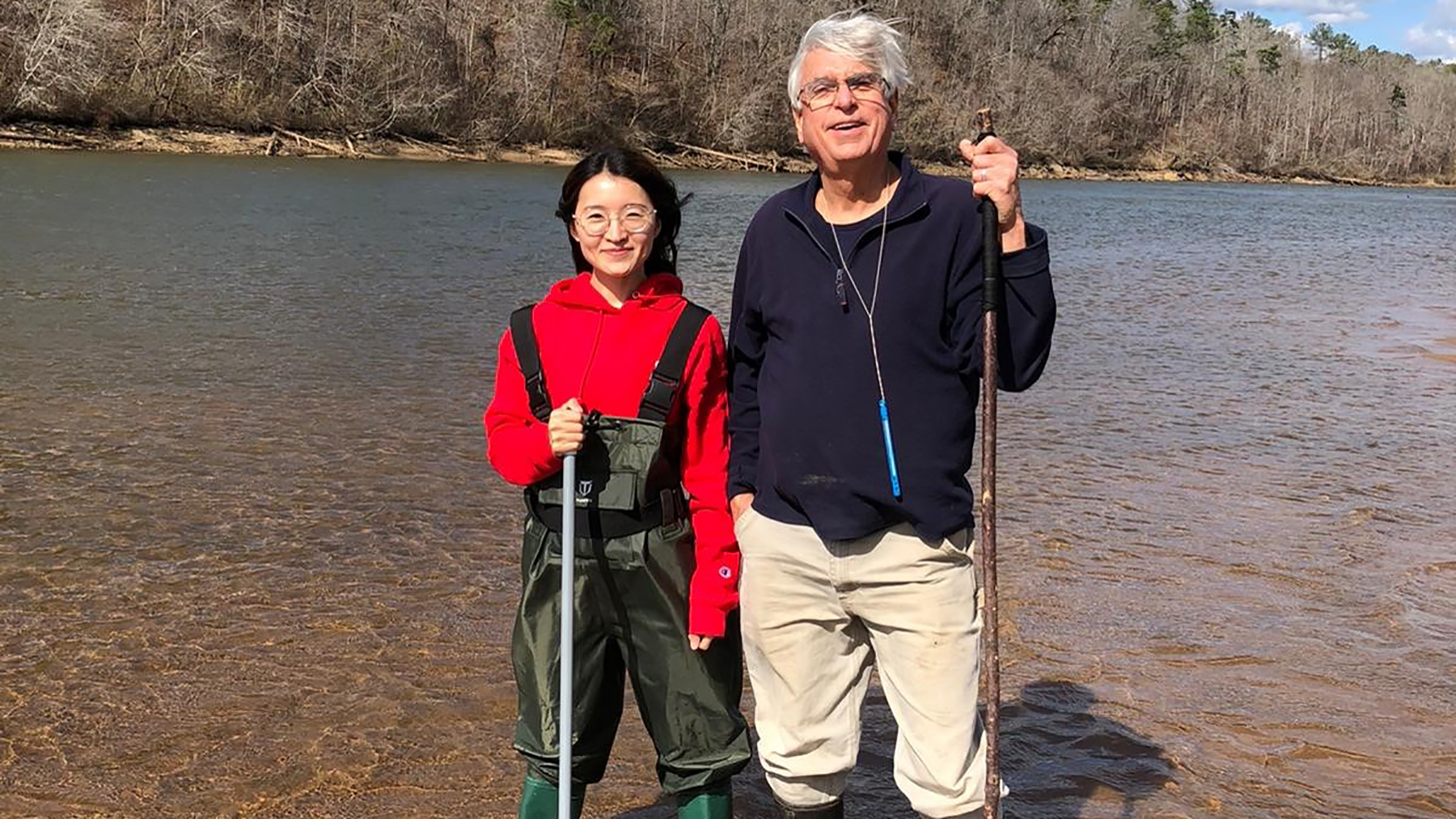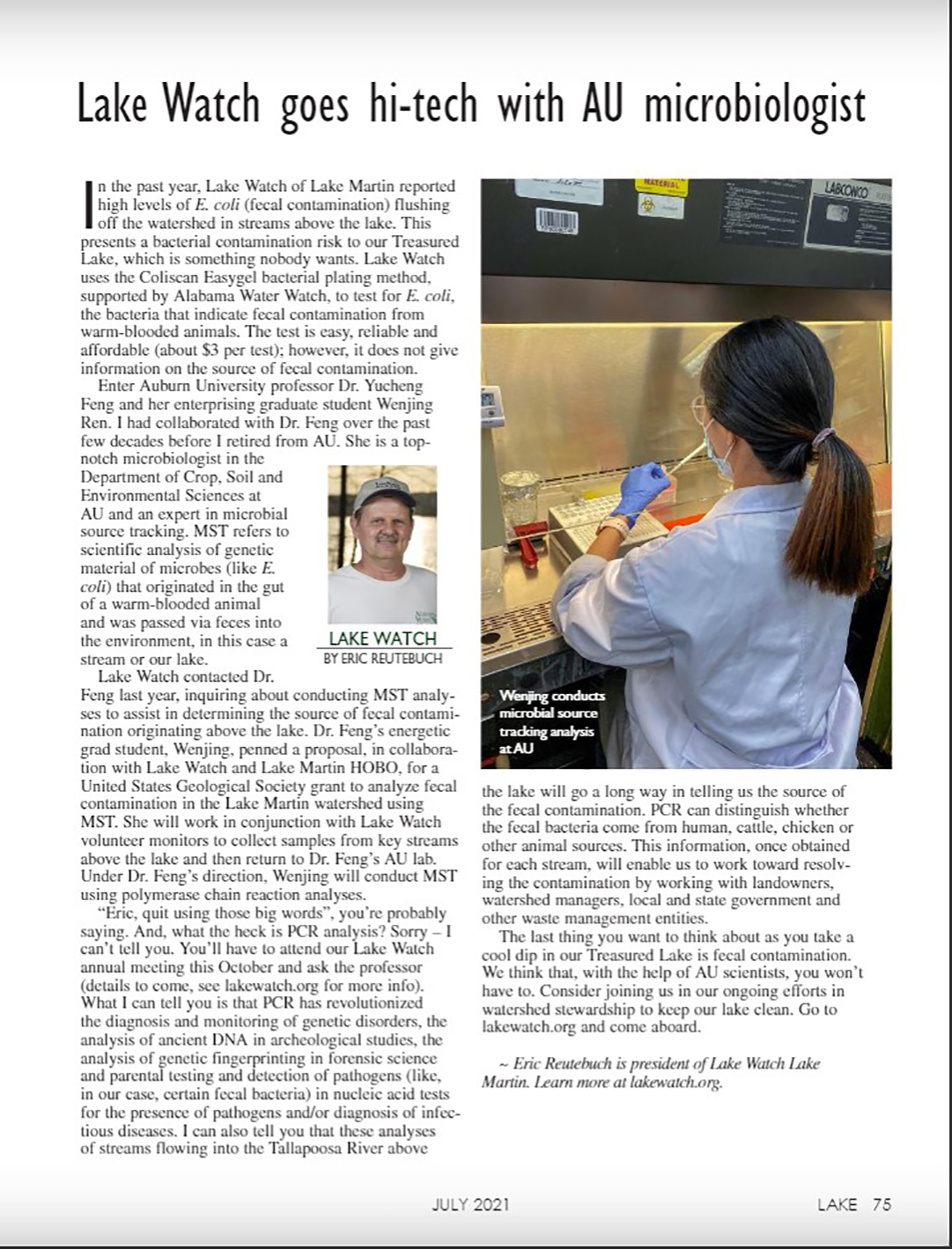
MEET ONE OF THE FUTURE FACES OF MICROBIOLOGY AND ECOLOGY: WENJING REN.
Wenjing Ren is a PhD candidate in the lab of Dr. Yucheng Feng of the College of Agriculture’s Department of Crop, Soil, and Environmental Sciences. Ren joined the lab in Fall 2018 after completing her M.S. in Fisheries under Dr.Shuanglin Dong and Dr. Li Li from the Ocean University of China in Qingdao, Shandong Province, China. Ren previously completed a B.S. in Aquaculture from Shandong Agricultural University in Tai’an city, Shandong Province, China.
During her undergraduate studies, Ren assisted graduate students with microbiology and molecular experiments. Her desire to attend graduate school was solidified after attending a seminar given by Dr. Shuanglin Dong from the Ocean University of China during her Junior year. Dr. Dong’s lectures inspired her to pursue aquatic ecology studies, eventually becoming a graduate student in Dr. Dong’s research group at the Ocean University of China following her graduation from Shandong Agricultural University.
Ren’s M.S. thesis focused on the transformation pathway of ammonia nitrogen in the shrimp culture system by regulating the light and Carbon/Nitrogen ratio to study the changes of water quality, shrimp gastrointestinal microbes, and growth condition. Ultimately, this research intended to provide theoretical guidance for creating an improved shrimp culturing model. During this time, Ren honed her knowledge in both microbiology and water environment regulation.
After years of studying the impact of the water environment on shrimp, she began to ponder further-reaching questions. Such as: how can we reduce natural water pollution to improve recreational water quality? What about the impact of the water environment on public health? But you might still be wondering what led Ren halfway across the globe to Auburn, Alabama…

AUWRC’s Sergio RuizCórdova sampling with Ren at Crooked Creek near Berwick, AL. Photo Credit: Wenjing Ren
During the second and third years of her graduate school experience at the Ocean University of China, Ren hosted Dr. Claude Boyd and Dr. Bill Daniels from Auburn University. It was during this visit she became interested in Auburn University. Following their visit, Ren searched for an AU Professor whose research focused on both microbiology and water pollution regulation. Enter Dr. Yucheng Feng. Dr. Feng’s core work strives towards a better understanding of microbial source tracking markers for the identification of fecal pollution sources in environmental waters: a perfect fit for Ren’s professional interests. While in communication with Dr. Feng, Ren applied and received a scholarship from the China Scholarship Council (CSC), joined the Feng’ Lab in 2018.
Ren’s PhD dissertation focuses on fecal contamination of surface waters and its impacts on public health and ecosystem integrity. The water quality of many waterways in the United States is deteriorating due to point and nonpoint source pollution from human and animal waste. Monitoring fecal indicator bacteria, such as Escherichia. coli (E. coli) and enterococci reveal the presence of fecal pollution in surface water, but they do not provide information about contamination sources.

Ren collecting water samples to be tested for fecal contamination with Dr. Yucheng Feng. Photo Credit: Wenjing Ren
Fecal contamination sources can be identified by using polymerase chain reaction (PCR) assays targeting host-associated genetic markers in fecal bacteria and mitochondrial DNA, such as humans, ruminants, pets, and wild animals. To have a comprehensive understanding of fecal contamination, Ren also applied 16s rRNA sequencing techniques to monitor the microbial communities in contaminated waters. Following these combined analyses, Ren has an increased understanding of the fecal contamination in the watershed as well as an estimate for potential gastrointestinal risk for humans.

Ren conducting field work with Lake Watch of Lake Martin member, Matt Campbell. Photo Credit: Wenjing Ren
To Ren, the most interesting part of her research is developing new tracking markers and applying them to the natural environment. During her research, Ren particularly enjoyed conversations and interactions with residents which have revealed the value of her hard work to the local community. She has spent ample time with Lake Watch Lake Martin (LWLM) in the field, more specially, LWLM’s Alabama Water Watch monitoring group.
During her time at AU, Ren has been an active member of the Graduate Water Resources Club, where she has met many wonderful future water resources professionals. Ren also broadened her network by attending the 2021 Alabama Water Resources Conference hosted by the AUWRC, where her oral presentation, “Evaluation of Bacterial and Mitochondrial DNA Markers for Microbial Source Tracking”, earned the top spot in the student oral competition.

Ren and her research were featured in Lake Martin’s Lake Magazine July 2021 Issue.
Perhaps Ren’s most impressive trait is her genuine passion for her work. She is driven by a strong interest in contributing to a meaningful academic field as well as a yearning for knowledge.
“When I dive deep into a certain field, I find that my knowledge accumulation is only the tip of the iceberg, and there are still many things to learn. I want to gain more knowledge and apply it to practice, which I think is very important, because all the research we do is to solve real-world problems”, says Ren.
When asked about the best advice she had received, Ren responded, “Don’t be afraid of research failure. When you encounter problems in research, don’t be ashamed to ask others for advice. Instead, communicate with outstanding scholars in your field. Learn and think by standing on the shoulders of giants.”
Ren’s anticipated graduation is late 2022. Following graduation, Ren plans to secure a university teaching position where she can continue her involvement in the combined research fields of microbiology and ecology to enrich and improve the knowledge of traceability and governance of water environment pollution.
